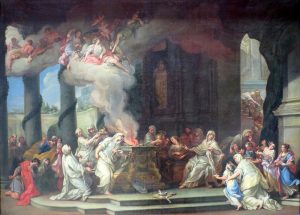The Vestal Virgins were important figures in ancient Roman religion. As the Virgo Vestalis Maxima (chief Vestal or directly translated as “greatest of the Vestals”) of their time, they were in charge of keeping the sacred flame in the Temple of Vesta alight, and they played a key role in religious ceremonies. As a result of their position, they wielded considerable political power and were often consulted on important matters.
Duties of the Vestals
The Vestal Virgins were considered to be some of the most powerful women in ancient Rome. They even had the power and authority to free prisoners and slaves by touching them. They were an order of priestesses who were tasked with maintaining Rome’s favor with her temperamental gods by tending diligently to the city’s most cherished religious observances. They watch over the goddess Vesta’s temple, keeping her sacred fire alight and performing various rituals. The Vestals were also responsible for guarding the goddess’ statue and her temple from pollution.
They were required to remain chaste for thirty years. When their term was up, they could retire from their duties and marry. The chief Vestal was the most important of the high priestesses and was responsible for ensuring that the other Vestals performed their duties correctly. In addition to her religious duties, she also had a great deal of political power and was consulted on important matters.
Execution of Cornelia
A Vestal’s virginity was considered to be a direct link to the burning of the sacred fire. If the fire would go out, it was believed to be a sign that the Vestal’s virginity had been compromised. The punishment for a Vestal who broke her vow was severe. She would be buried alive in a subterranean chamber beneath the Forum.
Cases of unchastity were rare. The best-known execution was of Cornelia. Ordered by Emperor Domitian, her execution caused great consternation. It was controversial because he summoned the sacred college not in the pontifical court but to his villa to condemn her for incest while he was guilty of defiling his own brother’s daughter. The young woman, a widow, in order to hide her shame, was forced to have an abortion and, as a result, lost her life.
Cornelia was not even present to defend herself against Domitian’s accusations. He directed the priests to execute her immediately. As they led Cornelia to the underground chamber for her execution, she called upon Vesta and the rest of the gods to attest to her innocence. Domitian was a notorious tyrant and had also ordered the execution of three other Vestals some years prior.
Roman lawyer and author Pliny the Younger was convinced that Cornelia was innocent. He described that when she descended into the underground chamber for her execution, her robe had caught in descending, but she turned around and gathered it up. He also wrote, “… when the executioner offered her his hand, she shrank from it, and turned away with disgust; spurning the foul contact from her person, chaste, pure, and holy: And with all the deportment of modest grace, she scrupulously endeavored to perish with propriety and decorum.” Celer, the Roman knight accused of being her lover, was also put to death. He was beaten to death with rods in the Forum while proclaiming that he had done nothing.
